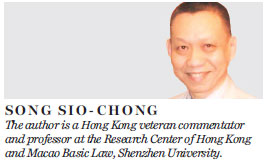We should only reject 'fake refugees'
Updated: 2016-03-17 08:51
By Song Sio-chong(HK Edition)
|
|||||||||
Song Sio-chong writes that taking HK out of the United Nations Convention against Torture could see the city neglect its responsibilities to the international community
During the annual session of the National People's Congress (NPC), Hong Kong NPC delegate and former secretary for security Ambrose Lee Siu-kwong suggested that the central government should take Hong Kong out of the United Nations' Convention against Torture and Other Cruel, Inhuman or Degrading Treatment or Punishment. This is in order to protect the SAR from the current international refugee crisis. I was astonished by this proposal.
For readers who may not be familiar with international law, the UK ratified the Convention against Torture in 1988 and extended its application to Hong Kong in 1992. China ratified it the same year as the UK. Since China is also a state party, it is clear the convention would continue to be applied in Hong Kong from July 1, 1997. This was confirmed by the central government in its notification to the UN secretary-general in June 1997, echoing Article 153 of the Basic Law.
Article 3 of the Convention against Torture stipulates that state parties shall not "expel, return (refouler) or extradite a person to another State where there are substantial grounds for believing that he would be in danger of being subjected to torture". This is known as the principle of "non-refoulement".
Is it unlawful for a state to pull out from a treaty? The answer is no - it is not unlawful. The Vienna Convention on the Law of Treaties allows a state to withdraw from a treaty "in conformity with the provisions of the treaty" (Article 54(a)). According to Article 31(1) of the Convention against Torture, a state party may denounce the convention simply by sending a written notification to the secretary-general of the UN.
However, just because you can doesn't mean you should. First, leaving the Convention against Torture will tarnish the international reputation of Hong Kong and the whole country. The convention is one of the most readily accepted international conventions, with 158 countries of the 193 UN members as state parties. By withdrawing from the convention, Hong Kong will be joining the ranks of nations like the DPRK and Zimbabwe. Indeed no European Union countries have so far renounced the convention just to rid themselves of any responsibility for the European refugee crisis - even when the EU is one of biggest places for refugees to go in the world. Implementing Lee's proposal will make China appear irresponsible in the eyes of the international community.
Second, leaving the convention does not free Hong Kong from all its international treaty obligations. Under the Unified Screening Mechanism (USM) launched in March 2014, non-refoulement claims can be made on the grounds of "torture or cruel, inhuman or degrading treatment or punishment" under Article 7 of the International Covenant on Civil and Political Rights (ICCPR) or Article 3 of the Hong Kong Bill of Rights, or on the grounds of persecution with reference to the principle under Article 33 of the 1951 Convention relating to the Status of Refugees, in addition to torture claims under the Convention against Torture. Applicants may therefore still make claims for refugee status.
Third, the right against torture is a jus cogens norm (or peremptory norm) accepted and recognized by the international community from which no derogation is permitted. Other examples of jus cogens norms include rights against genocide, war crimes, crimes against humanity, slavery and piracy. The International Criminal Tribunal for the former Yugoslavia (ICTY) case of Prosecutor v. Furundzija explains that a jus cogens norm "enjoys a higher rank in the international hierarchy than treaty law and even 'ordinary' customary rules". Therefore, even if Hong Kong got rid of all refugee - or human rights-related instruments, it would not be completely excused from its legal obligations against torture.
Finally, although Lee's concerns about the economic burden and social instability caused by refugees are well understood, he has incorrectly identified the issue. The problem does not reside in refugees, but in "fake refugees". From March 2014 to July 2015, the Immigration Department received a total of 9,884 non-refoulement claims, and managed to determine 1,873 cases (less than one-fifth of total claims). Among those heard, only eight were successful (i.e. success rate of 0.43 percent). In other words, 99.57 percent of the non-refoulement applicants were "fake refugees". Hong Kong has spent hundreds of millions of taxpayer's money every year on supporting the housing, food, transport and legal aid of these "fake refugees".
A correct response is to plug loopholes in existing domestic legislation and/or administrative process. The Convention against Torture only prohibits expulsion when there are "substantial grounds" for believing that the applicants will be in danger of torture. "Substantiality" is a high threshold. The Immigration Department should vehemently deport applicants submitting evidence which is less than substantial. Legal aid should not be granted to applicants whose cases have no adequate merits. In the effort to expedite the screening process, the department should seek assistance from the Ministry of Foreign Affairs. Together with the central government authorities, Hong Kong should set an example for the world as a place of efficient refugee management, providing resources for friends from around the world in genuine need.

(HK Edition 03/17/2016 page10)